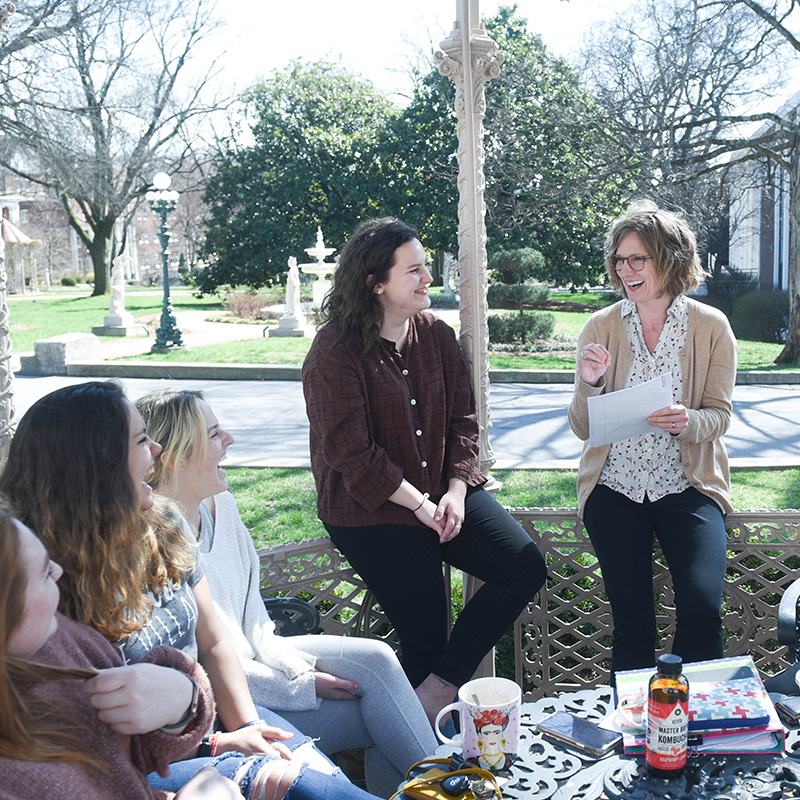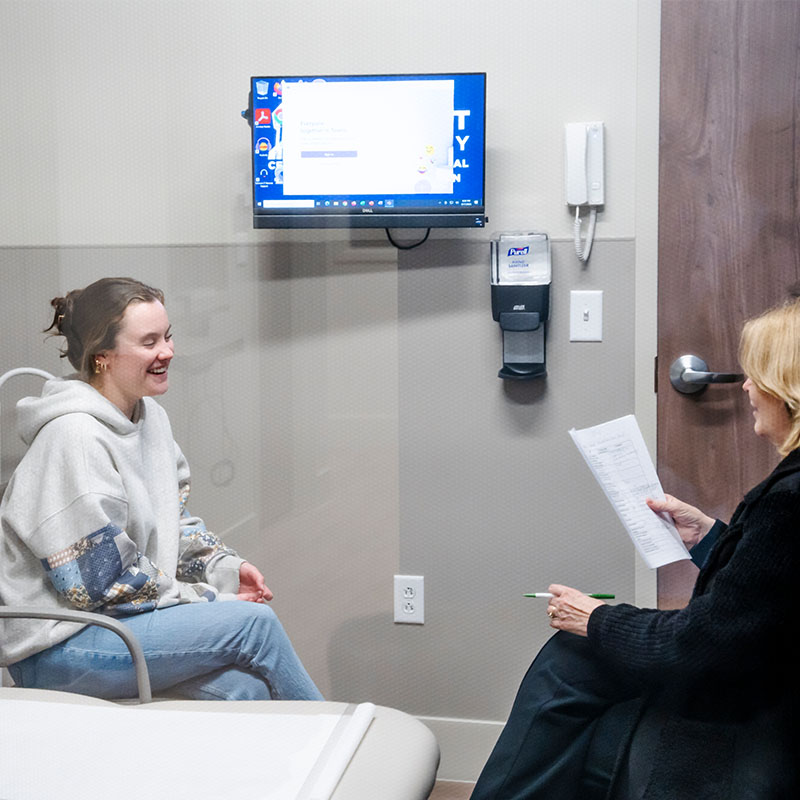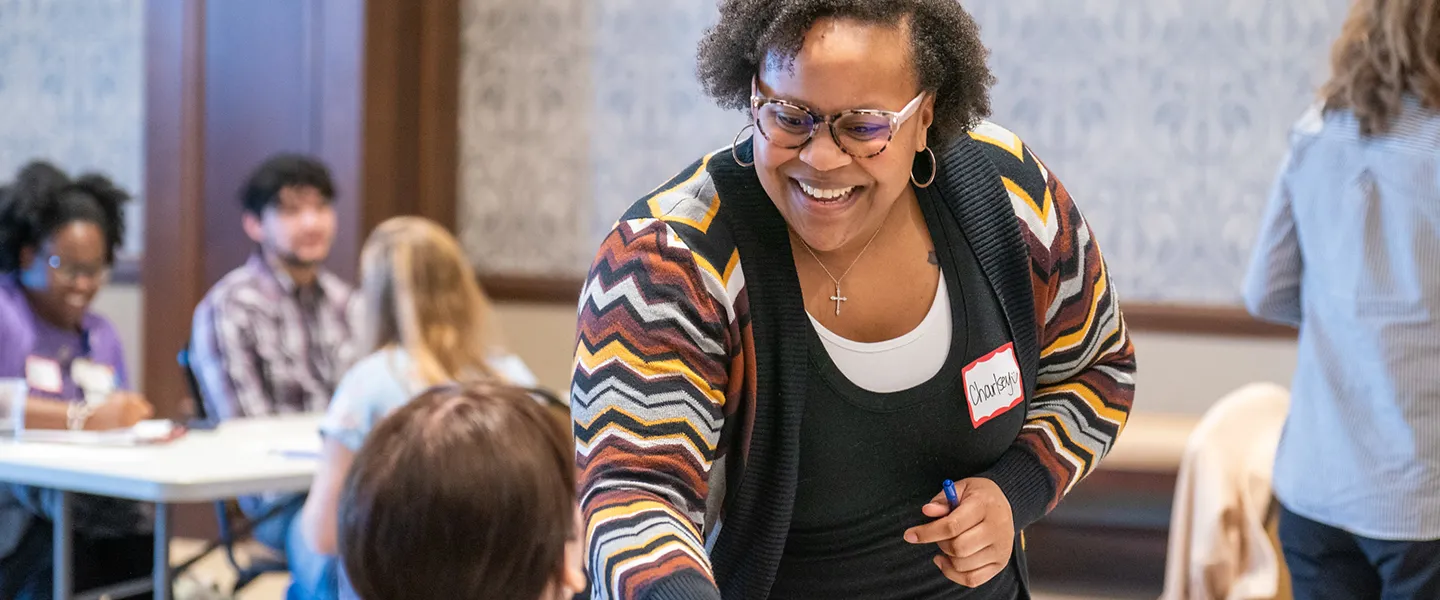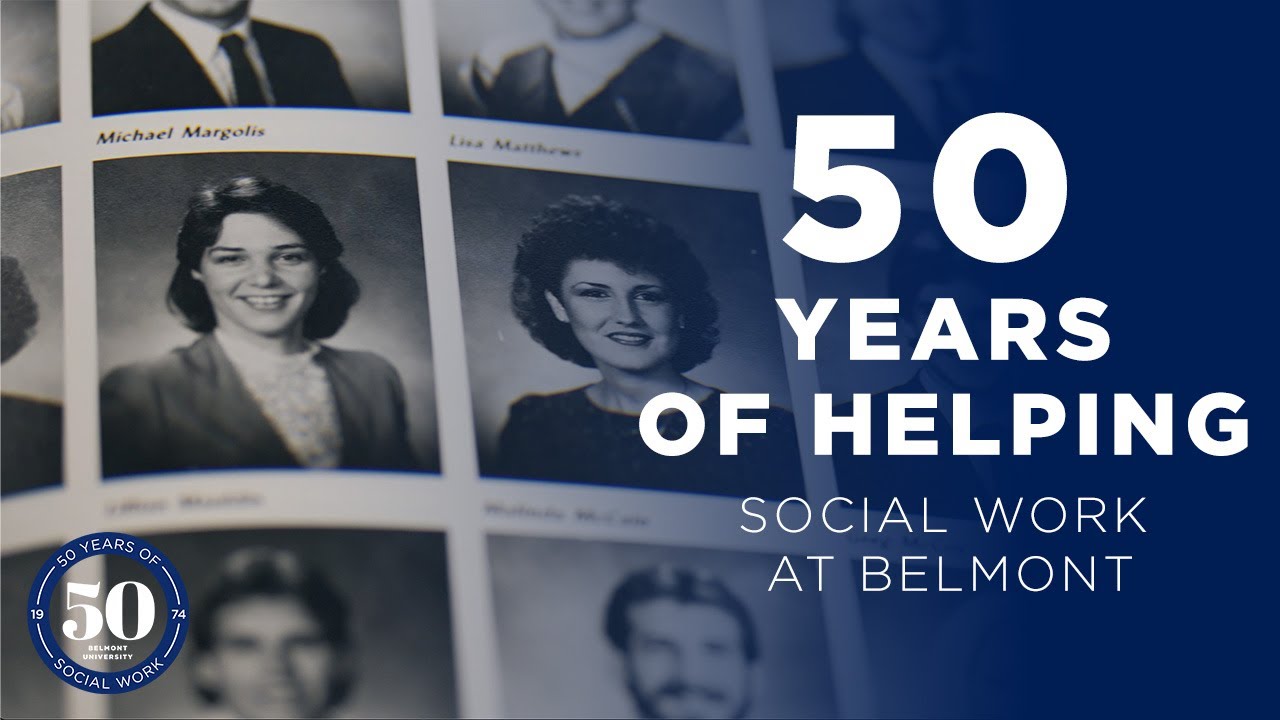Master of Social Work Program Overview
 The Belmont School of Social Work's master's in social work program delivers the academic rigor, clinical practice and personal support you need to launch a career in social work.
The Belmont School of Social Work's master's in social work program delivers the academic rigor, clinical practice and personal support you need to launch a career in social work.
-
Advanced Standing option for BSW holders, with no summer bridge work
-
Training in Belmont’s 60,000-sq-ft Center for Interprofessional Engagement and Simulation
-
Licensure preparation integrated into coursework and mentoring
-
900+ hours of personalized field experience, including options at your workplace
-
Close mentorship from expert, licensed faculty
-
A unique focus on trauma-informed care, advocacy and leadership
Learn More About Belmont's MSW
Advance your career with Belmont’s Master of Social Work (MSW) program. Small classes, personalized fieldwork, and built-in licensure prep set you apart.

Why Earn Your Master of Social Work at Belmont?
At Belmont, earning your MSW means more than completing coursework — it’s about joining a supportive community, gaining hands-on experience and preparing for licensure and long-term career success.
- Student-Centered Support: From day one, faculty partner with you to design a program of study and field placements that fit your passions and goals. Students are known, supported, and mentored every step of the way.
- Hands-On Learning in Real Settings: Through MSW field placements in agencies, schools, health care systems and nonprofits, you’ll apply classroom learning to practice — preparing for immediate impact after graduation.
- Preparation for Licensure and Career Success: Belmont’s Master of Social Work program integrates test prep into your courses so you graduate ready for your state’s social work license exam.
Curriculum and Learning Experience

The Master in Social Work curriculum at Belmont is designed to prepare students for advanced practice through a balance of theory, research and real-world application.
Our program emphasizes critical thinking, evidence-based practice and the ability to engage with clients and communities across diverse settings.
Core Coursework: In the classroom, masters in social work students develop essential competencies in clinical practice, policy analysis, advocacy and organizational leadership. Courses integrate a trauma-informed and social justice perspective, ensuring graduates are equipped to address the complex needs of individuals, families and communities.
Advanced Standing Option: If you already have a CSWE-accredited BSW, you can complete your Master of Social Work degree in as little as one year, thanks to Belmont’s true two-semester advanced standing program.
Simulation-Based Training: Unique to Belmont, MSW students learn in our 60,000-sq-ft Center for Interprofessional Engagement and Simulation, counseling simulated clients, conducting home visits and practicing therapy techniques in a supportive environment.
Master of Social Work Program Details
Curriculum
The Belmont MSW is a 60-credit hour advanced generalist in-person degree designed to provide students with the requisite knowledge, values, skills that support competency for advanced social work practice with individuals, families, groups, and communities/social systems.
- Foundational Coursework: 30 credit hours
- Advanced Coursework: 18 credit hours
- Trauma Theory and Leadership Coursework: 6 hours
- Elective Coursework: 6 credit hours
- Fieldwork/Internship: 900 clock hours over four courses
Courses You'll Take
- SWK 5000 Social Policy, History and Ethics
This course dives into the historical, ethical and policy foundations that shape social work practice. Students will examine the major fields of practice in the profession, and critically reflect on the development of social welfare policies, their historical contexts and the ethical principles guiding social work interventions. - SWK 5100 Social Work Practice I: Individuals and Families
This course is one part of a series of required Social Work practice courses taken in the foundational year of the MSW program. This course is an examination of the knowledge, values and skills central to the generalist practice of social work with individuals and families. Students use an understanding of the social work process to develop skills in in problem solving within the context of social work values and ethics. Emphasis is placed on the ability to engage and assess with individuals and families using a strengths-based and culturally responsive approach. - SWK 5200 Exploring Human Diversity
This exploring human diversity social work course is designed to provide students with an understanding of the cultural, social, economic and political factors that shape human diversity and the ways in which these factors impact individuals, families, groups and communities. Emphasis will be placed on understanding the unique experiences and perspectives of diverse populations and on developing skills in culturally responsive practice. The course will also cover self-care and self-awareness for the social worker. - SWK 5300 Human Behavior and the Social Environment
This course provides an overview of development through the lifespan in an environmental context. Students will use major theoretical frameworks to assess individual and family development and will examine the impact of diversity and of trauma on health and well-being. This course builds on a liberal arts background and is designed to provide an understanding of key biological, psychological, social, spiritual, historical and cultural factors associated with individual development, as applied to social work practice. - SWK 5400 Field Instruction I
The signature pedagogy of the Master of Social Work degree is the field experience. In this experiential course, students will complete 200 hours of fieldwork, supervised by a professional social worker in a local social service agency. This will provide the student an opportunity to apply classroom knowledge in a practice setting. Emphasis is on developing generalist social work practice skills with individuals, families, groups and organizations. The accompanying seminar provides a supportive environment for processing the field experience, and space for students to reflect on their knowledge, skills and abilities as they move from theoretical understanding to applied learning. - SWK 5500 Social Work Research Methods
This course is designed to introduce social science research methods in the context of social work practice. This foundational level course will encourage critical thinking skills that build on a liberal arts undergraduate education in science, social sciences, and the humanities. Emphasis will be placed on how research skills are integrated within social work practice. Specifically, this course will examine the relationship between theory and research, conceptualization of research questions and hypotheses, and elements of research design. Both qualitative and quantitative methodologies will be introduced as a means of building knowledge for practice. - SWK 5600 Social Work Practice II: Groups, Organizations, and Communities
This course is designed to provide students with the knowledge and skills necessary to work effectively with diverse groups and communities in a variety of settings. The course will cover group work theories and interventions, as well as social justice principles for community organizing. Emphasis will be placed on understanding the impact of systems of oppression and discrimination on groups and communities and learning how to address these issues in organizational practice settings. Students will develop skills in culturally responsive practice, including understanding and valuing the unique perspectives and experiences of group members and community members. - SWK 5700 Social Work Policy Analysis and Advocacy
This course examines the history of social welfare policy in the United States and analyzes the values and assumptions that form the foundation of social welfare policies and programs. This course introduces students to the key social policies and programs that shape current social work practice while providing a historical context for how they came to be. - SWK 5800 Psychopathology
This course provides an in-depth exploration of psychopathology with a focus on understanding the complex interplay of biological, behavioral, emotional, cognitive, and social factors that influence mental health. Grounded in trauma-informed practice and utilizing the DSM-5 as a guide, students will examine how various influences converge to impact individuals' mental health trajectories. - SWK 5900 Field Instruction II
This course is designed to provide students with the knowledge and skills necessary to work effectively with diverse groups and communities in a variety of settings. The course will cover group work theories and interventions, as well as social justice principles for community organizing. Emphasis will be placed on understanding the impact of systems of oppression and discrimination on groups and communities and learning how to address these issues in organizational practice settings, via 200 hours of fieldwork. Students will develop skills in culturally responsive practice, including understanding and valuing the unique perspectives and experiences of group members and community members. - SWK 6000 Advanced Practice with Individuals & Families
This course will provide students with the knowledge and skills necessary to work effectively with individuals, couples, and families in a variety of settings. The course covers advanced practice theories, interventions and ethical considerations specific to working with individuals and families. Emphasis will be placed on understanding the impact of systems of oppression and discrimination on individuals, couples and families and learning how to address these issues in practice. Students will also develop skills in culturally responsive practice, including understanding the unique perspectives and experiences of clients. The course will also cover self-care and self-awareness for the social worker. - SWK 6100 Advanced Practice with Groups
This course is designed to provide students with the knowledge and skills necessary to work effectively with diverse groups in a variety of settings. The course will cover advanced group work theories and interventions, as well as ethical considerations and cultural responsiveness in group practice. Students will learn how to design, facilitate, and evaluate group work, and will also examine the impact of systems of oppression on individuals and groups. Emphasis will be placed on the process of forming, developing, and terminating groups and the importance of self-care and self-awareness in group work practice. - SWK 6200 Trauma Theory in Practice
This course will present the current conceptualizations of trauma and trauma-informed care from an ecological perspective. Emphasis is placed on the biology and neuroscience of stress and trauma, the effects of trauma on populations at-risk and the evolving conceptualization of social work’s role in the treatment and prevention of stress and trauma. Acquisition of diagnostic skills will be emphasized throughout the course as well as the knowledgeable application of “trauma-informed care” to all levels of advanced practice. Students will consider issues such as vicarious trauma, compassion fatigue, and burn-out, exploring approaches to self-care and promotion of wellness. Through case presentations, written work, and class discussions students are encouraged to use their experiences in the field to deepen their understanding of course content. - SWK 6000 Level Electives
Students will be able to choose a minimum of two elective courses during their specialized curriculum. These courses will allow students a chance to explore theoretical perspectives more deeply, populations of interest, practice areas, or social problems. Exemplar courses include Race-Based Trauma, Poverty in the United States, Mental Health Practice, Crisis Intervention, School Social Work and Family Practice in Social Work. - SWK 6300 Field Instruction III
In this third experiential course, students will complete an advanced generalist placement in a micro, macro and/or mezzo environment. This second field placement, supervised by a professional social worker in a local agency, will provide the student an opportunity to further apply advanced knowledge to practice through the course of 250 required field hours. Students will engage in specialized practice in a local social service setting. Emphasis is on furthering skills of advocacy, and leadership in social work practice. - SWK 6400 Advanced Practice with Organizations & Communities
This course explores contemporary theories, models and practices for leadership in human service organizations, emphasizing skills in team building, program design and implementation, development and funding, and organizational change. The community practice dimensions of this course engage students in examining theory, methods and strategies for community practice within complex political and economic environments. - SWK 6500 Evaluation for Advanced Social Work Practice
This course provides students with the knowledge and skills needed to evaluate their practice and the programs in which they work. Students will develop evaluation skills which can be used as practical tools for social change by improving the quality of individual level and social programming. In acquiring these skills, in the context of their field placement, students will: a) explore ethical responsibilities associated with evaluating practice; b) apply research methods to conceptualize and measure problems and goals; c) implement research design and methods of evaluation; d) conduct data analyses and interpret results; and e) report their findings. - SWK 6600 Leadership for Advanced Social Work Practice
This integrative seminar provides students with the knowledge and skills to be leaders in their practice environments and communities. Students will learn models and theories related to general supervision, power, and authority in public and nonprofit organizations. The course will explore the influence of politics, economics, technology, and socio-cultural factors within supervisory practice, across multiple contexts. Students will explore social work leadership ethics and deepen their understanding of caring for self and others. A capstone experience, this course will also support students in their preparation for employment and licensure. - SWK 6700 Field Instruction IV
The signature pedagogy of the Social Work degree is the field experience. In this fourth experiential course, students will continue an advanced generalist placement in a micro, macro and/or mezzo environment, supervised by a professional social worker in a local agency. This will provide the student an opportunity to further deepen and apply advanced knowledge to practice through 250 required hours of field work. Emphasis is on deepening skills of advocacy, leadership and social work practice in a specialized setting. Additional attention is given to preparing students for post-program destinations.
Year One
| Semester 1: Fall | Hours | Semester 2: Spring | Hours |
|---|---|---|---|
| SWK 5000 Social Policy, History, & Ethics | 3 | SWK 5500 Social Work Research Methods | 3 |
| SWK 5100 Social Work Practice I: Individuals & Families | 3 | SWK 5600 Social Work Practice II: Groups, Organizations, & Communities | 3 |
| SWK 5200 Exploring Human Diversity | 3 | SWK 5700 Social Work Policy Analysis and Advocacy | 3 |
| SWK 5300 Human Behavior in the Social Environment | 3 | SWK 5800 Psychopathology | 3 |
| SWK 5400 Field Instruction 1 (200hrs) | 3 | SWK 5900 Field Instruction 2 (200hrs) | 3 |
| Total Hours | 15 | Total Hours | 15 |
Year Two
| Semester 3: Fall | Hours | Semester 4: Spring | Hours |
|---|---|---|---|
| SWK 6000 Advanced Practice with Individuals & Families | 3 | SWK 6400 Advanced Practice with Organizations & Communities | 3 |
| SWK 6100 Advanced Practice with Groups | 3 | SWK 6500 Evaluation for Advanced Social Work Practice | 3 |
| SWK 6200 Trauma Theory in Practice | 3 | SWK 6600 Leadership for Advanced Social Work Practice | 3 |
| SWK 6000 Level Elective | 3 | SWK 6000 Level Elective | 3 |
| SWK 6300 Field Instruction 3 (250hrs) | 3 | SWK 6700 Field Instruction 4 (250hrs) | 3 |
| Total Hours | 15 | Total Hours | 15 |
Year One
| Semester 1: Fall | Hours | Semester 2: Spring | Hours |
|---|---|---|---|
| SWK 5000 Social Policy, History, & Ethics | 3 | SWK 5500 Social Work Research Methods | 3 |
| SWK 5100 Social Work Practice I: Individuals & Families | 3 | SWK 5600 Social Work Practice II: Groups, Organizations, & Communities | 3 |
| SWK 5200 Exploring Human Diversity | 3 | SWK 6000: Level Elective | 3 |
| Total Hours | 9 | Total Hours | 9 |
Year Two
| Semester 3: Fall | Hours | Semester 4: Spring | Hours |
|---|---|---|---|
| SWK 6200 Trauma Theory in Practice | 3 | SWK 5700 Social Work Policy Analysis and Advocacy | 3 |
| SWK 5300 Human Behavior in the Social Environment | 3 | SWK 5800 Psychopathology | 3 |
| SWK 5400 Field Instruction 1 (200hrs) | 3 | SWK 5900 Field Instruction 2 (200hrs) | 3 |
| Total Hours | 9 | Total Hours | 9 |
Year Three
| Semester 5: Fall | Hours | Semester 6: Spring | Hours |
|---|---|---|---|
| SWK 6000 Advanced Practice with Individuals & Families | 3 | SWK 6600 Leadership for Advanced Social Work Practice | 3 |
| SWK 6100 Advanced Practice with Groups | 3 | SWK 6400 Advanced Practice with Organizations & Communities | 3 |
| SWK 6000 Level Elective | 3 | SWK 6500 Evaluation for Advanced Social Work Practice | 3 |
| SWK 6300 Field Instruction 3 (250hrs) | 3 | SWK 6700 Field Instruction 4 (250hrs) | 3 |
| Total Hours | 12 | Total Hours | 12 |
|
Semester 1: Fall |
Hours |
Semester 2: Spring |
Hours |
|---|---|---|---|
|
SWK 6000 Advanced Practice with Individuals & Families |
3 |
SWK 6400 Advanced Practice with Organizations & Communities |
3 |
|
SWK 6100 Advanced Practice with Groups |
3 |
SWK 6500 Evaluation for Advanced Social Work Practice |
3 |
|
SWK 6200 Trauma Theory in Practice |
3 |
SWK 6600 Leadership for Advanced Social Work Practice |
3 |
|
SWK 6000 Level Elective |
3 |
SWK 5800 Psychopathology |
3 |
|
SWK 6300 Field Instruction 3 (250hrs) |
3 |
SWK 6700 Field Instruction 4 (250hrs) |
3 |
|
Total Hours |
15 |
Total Hours |
15 |
Applications for admission and an applicant’s credentials are received exclusively through the Social Work Centralized Application Service (SocialWorkCAS).
Learn more about the admissions process
The Belmont University MSW Program has achieved candidacy for accreditation by the Council on Social Work Education’s (CSWE) Board of Accreditation (BOA). Candidacy status indicates that it has made progress toward meeting standards of program quality evaluated through a peer review accreditation process. A program that has attained candidacy status has demonstrated a commitment to meeting the accreditation standards but has not yet demonstrated full compliance. Students that are admitted to candidate programs in the fall (or later) of the academic year in which the program is granted candidacy status will be retroactively recognized as graduates from a CSWE-BOA accredited program as long as the program attains initial accreditation. Candidacy is typically a 3-year process and attaining candidacy does not guarantee that a program will eventually attain initial accreditation. Candidacy applies to all program options, which include locations and delivery methods. Accreditation provides reasonable assurance about the quality of the program and the competence of students graduating from the program. Review our program’s candidacy status in CSWE’s Directory of Accredited Programs. For more information about social work accreditation, contact CSWE’s Department of Social Work Accreditation.
Once accredited by the Council on Social Work Education, those earning a Master’s degree in Social Work from Belmont University have met the first of several steps needed to attain state licensure to practice social work at the Master’s level. It is important to note that state licensure is a separate process from that of attaining your master’s degree and requires additional criteria. For example, Tennessee requires that additional examinations be taken. State licensure is handled through state boards and not through Belmont University. Students are advised to seek licensure information through the requisite state Department of Health’s Social Work Licensure Board. Belmont’s faculty and staff are a resource for Belmont MSW graduates seeking licensure but are the licensing authority.
Note that a felony conviction may affect a graduate's ability to be eligible to take the national certification examination or obtain state licensure.
What is Field?
Field Partners
Committed to Your Success

Belmont University's MSW program prioritizes career and professional development by providing students with access to the Office of Career & Professional Development, career coaching, resume assistance and networking events like job fairs. These resources, along with field placements and employer connections, equip students with the skills needed to excel in the workforce.
Additionally, the MSW curriculum is designed with employer needs in mind, emphasizing trauma-informed care and leadership in advocacy practice. To further support graduates, the program offers licensure prep courses for the LMSW exam, ensuring they are well-prepared for professional success.
97% of College of Pharmacy & Health Science graduates are employed, pursuing continuing education, or enlisted in the military within 6 months of graduation and 97% of employed graduates are in positions that align with their short or long term career goals.
Learn more about Career & Professional Development at Belmont
Career Possibilities
A Master of Social Work degree opens doors to a wide range of career possibilities, offering unparalleled versatility in both the public and private sectors. Graduates can work in health care, education, mental health, policy advocacy, nonprofit organizations and government agencies, addressing diverse social issues from mental health support to community development.
With skills in counseling, advocacy, and program management, social workers are equipped to make a difference in various environments. Whether in direct practice or leadership roles, the opportunities for social work professionals are vast, allowing them to create lasting impact across communities.
Licensed Clinical Social Workers (LCSW) provide mental health therapy and counseling to individuals, families, and groups facing various psychological and emotional challenges. They assess clients' needs, develop treatment plans, and employ therapeutic techniques to promote mental well-being.
LCSWs often work in diverse settings, including hospitals, private practices, and community organizations, addressing issues such as anxiety, depression, and trauma. Additionally, they may offer case management services, connecting clients with resources and support systems to enhance their overall quality of life.
Mental and Behavioral Health counselors play a crucial role in assisting individuals struggling with various mental health issues, including alcoholism, addictions, and depression. They provide guidance and support to help clients develop coping strategies and improve their overall well-being.
These professionals often work in diverse settings, such as rehabilitation centers, hospitals, and private practices. By fostering a supportive environment, behavioral disorder counselors empower their clients to make positive changes in their lives.
Military Affairs Social Workers provide support and counseling to military personnel, veterans, and their families. They address mental health issues, such as PTSD and depression, and help clients navigate the challenges associated with military life.
These professionals often collaborate with military organizations and community resources to ensure comprehensive care. Additionally, they may offer crisis intervention and assist with the reintegration process after deployment.
Non-Profit Leaders use their expertise to develop and implement programs that address social issues and improve community well-being. They leverage their understanding of human behavior and social systems to advocate for marginalized populations and drive organizational change.
These leaders foster collaboration among staff, volunteers, and community partners to maximize resources and impact. Additionally, they focus on securing funding and resources to sustain initiatives, ensuring the non-profit's mission is effectively realized.
Hospital Social Workers assist patients and their families in navigating the health care system during hospital stays. They provide emotional support, counseling, and resources for coping with medical diagnoses and treatment plans.
These professionals also help with discharge planning, ensuring patients have the necessary support and services post-hospitalization. Additionally, they may advocate for patients' needs and coordinate with medical staff to facilitate comprehensive care.
Frequently Asked Questions About MSW Programs
Yes, a master’s in social work (MSW) is worth it if you want to advance your career, increase earning potential and qualify for licensure-required roles. With an MSW, you can move into clinical practice, leadership, or specialized fields that aren’t open to those with only a bachelor’s degree.
Belmont’s MSW prepares graduates with hands-on training, trauma-informed care expertise and licensure prep to make the degree both practical and rewarding.
A traditional Master of Social Work program typically takes two years of full-time study, while an advanced standing MSW (for students with a CSWE-accredited BSW) can often be completed in just one year.
Belmont’s MSW offers both formats — a two-year track and a true two-semester advanced standing option with no summer bridge required.
Yes, you are welcome to apply for Belmont's MSW program in the year preceding your graduation. All credits associated with your bachelor's degree must be completed before June 1, and your final transcript must be sent to Belmont.
The highest paying jobs in social work are typically in clinical practice, health care and leadership roles such as clinical directors, social work administrators or health care social workers.
No, students do not need an undergraduate degree in social work to apply. We do not require a specific major to apply for the MSW. Common majors include psychology, child and family studies, sociology, public policy and other social science disciplines.
No, Belmont University's MSW program does not require an interview. However, the faculty reserves the right to request an introductory interview to ensure that we can fully evaluate your application for admission.
Additionally, information sessions and campus preview days will be scheduled throughout the year to offer students an opportunity to visit Belmont and learn more about the MSW and School of Social Work in person!
Yes, there is a part-time option enrolling now. Please reach out to your admissions counselor for further information.
Yes, students with undergraduate course credit from a CSWE-accredited baccalaureate social work program, earned within the last seven years, are entitled to have generalist-equivalent course credit evaluated for waiver, regardless of the undergraduate degree they hold or their ability to enter the advanced standing program.
Applicants requesting a transfer of credits must also meet specific criteria and provide additional documentation. Institutional policy holds graduate applicants can request the transfer of up to 15 graduate credit hours, while advanced standing transfer applicants can request up to 9 credits.
Yes, there are scholarships available and we encourage early applications to be considered for these. Additionally, students who have previously graduated from Belmont University with an undergraduate degree earn a 20% reduction of the cost of graduate tuition when enrolling into a Belmont graduate program. Students must complete the graduate application by the appropriate deadline and be accepted to the graduate program. No additional institutional scholarships, grants, assistantships, and/or discounts can be applied if opting to receive the alumni discount.
Additionally, students also fund tuition through loans or private sources. All questions concerning financial aid should be directed to our Student Financial Services department. You can reach the Student Financial Services office by phone at 615-460-6403 or online.
Belmont does not offer graduate student housing but does have resources available to students who are looking to relocate to the Nashville area.
Contact Us
College of Pharmacy & Health Sciences
Sarah Caylor
Assistant Director of Graduate Admissions
(615) 460.6722
Email Sarah
Schedule a Call


